Metal roof roll forming machines are equipment used to convert flat metal sheets into customized roofing and wall panels. This equipment is in high demand due to increased construction activity and infrastructure projects. We discuss the working, types, cost considerations, and suppliers of these machines.
Metal Roof Roll Forming Machine Equipment
A metal roof roll forming machine takes a coil of flat sheet metal and processes it through a series of roller dies to shape it into various long panel profiles. Common panel profiles produced are corrugated, box ribbed, flat, standing seam, concealed fix, and several other customized shapes.
The main components of a metal roof sheet roll forming machine are:
- Decoiler to hold the sheet coil
- Feeder section with pinch rolls to feed the sheet
- Forming stations with roller dies to shape the sheet
- Fly shear/rotary shear to cut panels to length
- Stacker to collect cut panels
Other optional accessories are embossing unit, notching, hole punching units as per application needs.
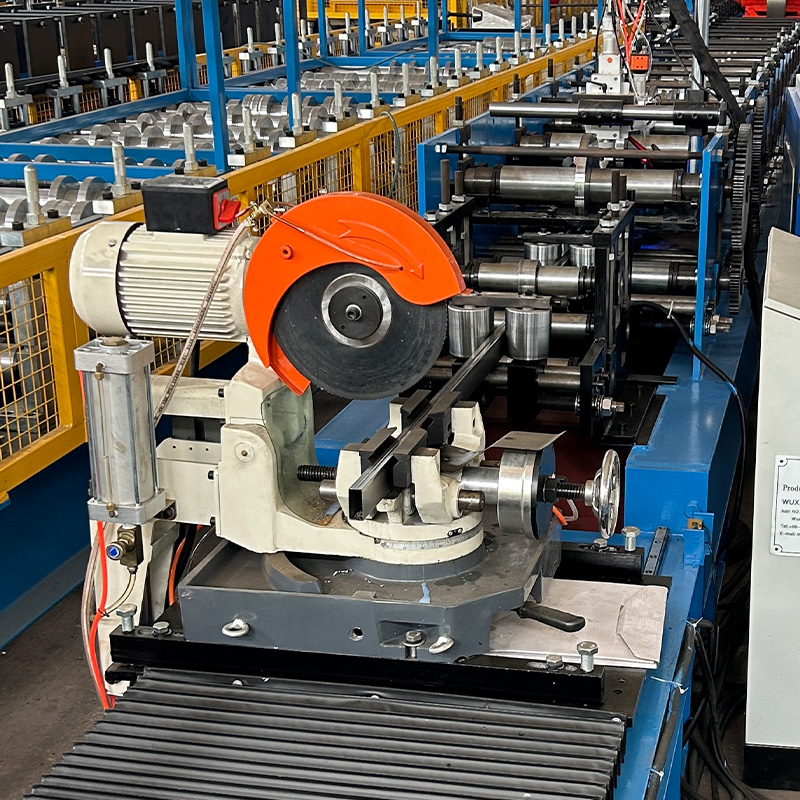
Types of Metal Roof Roll Forming Machines
| Type | Description |
|---|---|
| By Capacity | Light duty, medium duty, heavy duty depending on sheet thickness handled |
| By Operation | Manual, Semi-automatic, Fully-automatic with servo motor drives & plc control |
| By Forming Type | Cold roll forming at room temperature |
| By Structure | All-in-one combined units, Separate component modular machines |
| By End-Use | Roofing, Wall paneling, Rolling shutter, Highway barriers, Drainage profiles |
Working Process of a Roofing Sheet Roll Forming Machine
The working process involves decoiling a thin metal sheet and feeding it through a series of stands containing roller dies. As the sheet passes each stand, it takes the shape defined by the profile of the rolls. Finally, the long formed profile sheet is cut into lengths by the shear and collected on the exit stacker.
For complex profiles more forming stands are used to achieve the desired shape gradually. Inline operations like punching holes, notching, embossing can also be incorporated.
Material Feeding, Forming, Design in Roof Panel Roll Forming
Sheet Metal Material Selection
Common sheet metals are galvanized steel, galvalume steel, pre-painted steel, aluminum sheets, stainless steel sheets depending on corrosion resistance, strength, and cost considerations for the application.
Thickness range: 0.15mm to 1.2mm Width range: 600mm to 1250mm
Material surface coating, width, thickness, and mechanical properties are to be specified when ordering the roof sheet roll forming equipment.
Profile Shape Options
Over 100+ standard and custom profiles for roofing and wall flashings are possible. Some common ones being manufactured are:
- Trapezoidal rib / Corrugated sheets
- Box ribbed sheets
- Standing seam sheets
- Wide pan sheets
- Deeplink sheets
- Concealed fix sheets
- Composite panels
- Clip-lock panels
Custom profiles can be developed based on architectural drawings.
Roll Tooling Design & Bending
The profile is designed and roll passes are calculated using software like MetalForm and SigmaNest. The flower pattern outlines the progressive bending steps.
The rolls are CNC machined from D2 steel and heat treated to 45-50 HRC for sheet metal forming hardness.
-
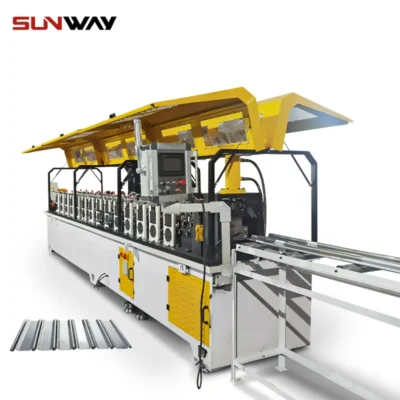 Rolling Shutter Slat Roll Forming Machine
Rolling Shutter Slat Roll Forming Machine -
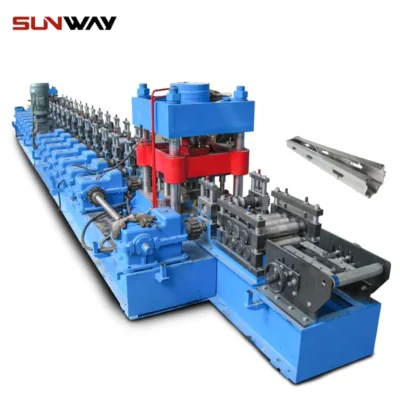 Vineyard Post Roll Forming Machine
Vineyard Post Roll Forming Machine -
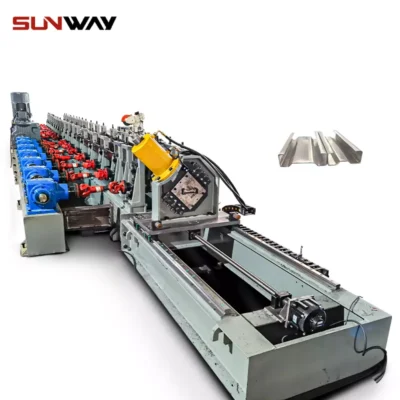 Auto Size Changeable Sigma Purlin Roll Forming Machine
Auto Size Changeable Sigma Purlin Roll Forming Machine -
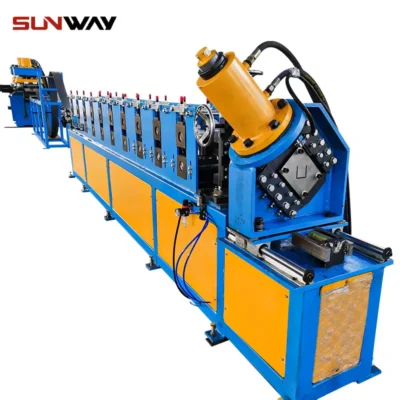 Electrical Cabinet Frame Roll Forming Machine
Electrical Cabinet Frame Roll Forming Machine -
 Din Rail Roll Forming Machine
Din Rail Roll Forming Machine -
 Cable Ladder Roll Forming Machine
Cable Ladder Roll Forming Machine -
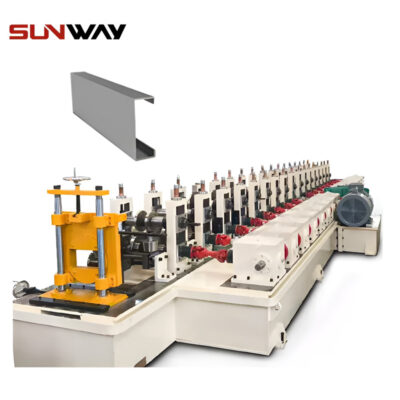 PV Mounting Bracket C Shape Profile Roll Forming Machine
PV Mounting Bracket C Shape Profile Roll Forming Machine -
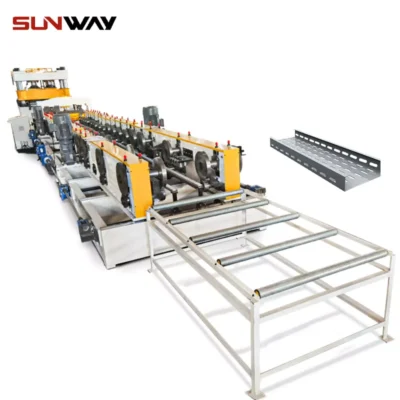 Cable Tray Roll Forming Machine
Cable Tray Roll Forming Machine -
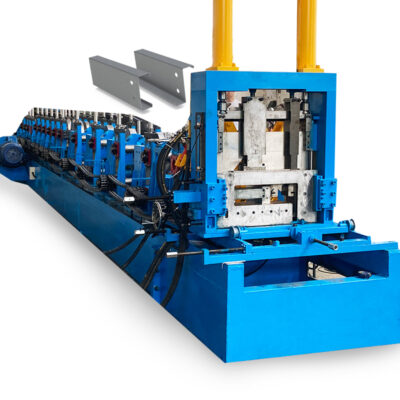 C Z Purlin Channel Cold Roll Forming Machine Full Auto Galvanized Steel Profile
C Z Purlin Channel Cold Roll Forming Machine Full Auto Galvanized Steel Profile
Slicing and Customization in Roll Formed Sheets
- Fly Shear – Guilotine type shear with top and bottom blades is used for instant squaring of the panels. No scratches or deformation to panels.
- Rotary Shear / Circular Shear – Used where curved edges or notch cuts are required on panels.
- Hole Punching Units – For making bolt holes on the sheet for fixation.
- Embossing Rollers – For decorative bumps/geometry.
- Notching Unit – For connecting flashings between panels.
- Length Cutting Control – Cut to length as per order requirement from 0.5m to 12m.
- Stacker – Collects cut panels sequentially.
Leading Roll Forming Machine Manufacturers & Cost Range
| Brand | Location | Price Range |
|---|---|---|
| Zhongli Roll Forming Machine | China | $5000-$15000 |
| BOTOU Xianfa Roll Forming Machine | China | $6000-$18000 |
| Jouanel Industrie | France | $8000-$25000 |
| Shanghai Rollwell Machinery | China | $4000-$28000 |
| Bradbury Group | UK | $12000-$50000 |
| Formtek | USA | $15000-$78000 |
| Dynamik Roofing Machines | South Africa | $5000-$21000 |
| Wolffkran | India | $4000-$15000 |
| Howick Ltd. | New Zealand | $13000-$71000 |
| Framecad Technologies | New Zealand | $14800-$128000 |
| CO-Z Roll Forming Machinery | Taiwan | $8800-$38000 |
| SIPPI Machine Tools | India | $3500-$12000 |
Light duty basic machines for thin sheets cost $4000 to $15,000. Heavy duty fully automatic fast machines with production over 100meters/minute cost over $40,000.
European and American manufacturers generally have higher prices but better quality and durability up to 20 years lifespan.
Installation and commissioning
- The roll forming machine requires a covered shade and flat platform for placement. It needs 3 phase electrical connection.
- Once bolted and grouted on the floor, the decoiler sheet coil is loaded and threaded through the entry guides.
- Machine is run on trial at slow speed, presets adjusted to center the sheet alignment. Gradually speed increased in steps up to production speed while checking vibration, noise issues.
- Multiple coiljoining is setup for automatic splicing when coil ends. Run some test panels through the entire process from feeding to stacking. Check for any scratches, deformation of panels.
- Fine tune all setting presets related to feed angle, shear depth, cut length variations.
- The machine is now ready for starting production after successful commissioning.
Operation and Working
- Machine operator feeds the sheet coil on unwinding decoiler and threads sheet through entry guides adjusting the feed angle.
- Length and shape profile is selected on the PLCD screen by choosing saved recipes.
- Jog buttons allow inch-wise movement for adjustments. Auto mode starts production run as per set speed and length parameters.
- Formed panels getting cut drop onto exit conveyor and stacker which can be collected in trolley. Counters keep track of production.
- Periodic oiling of moving shafts is needed. Roller guides, shear blades need inspection and replaced when worn out. Electric panel, motors and wires need checks for heating or loose contacts.
Maintenance Tips
- Clean sheet metal slivers, scrap pieces frequently off the floor
- Ensure proper frame grounding and safety signs on machine
- Check screw tightness on stands periodically
- Inspect roll bearings & gearbox oil levels
- Monitor electrical load when running
- Apply rust preventive coating on unpainted machine parts
- Check hydraulic system oil leakage, filter clog, pump operation
Proper maintenance improves lifespan, performance and safety.
Selection Criteria When Buying Roll Forming Equipment
Parameters to compare:
- Sheet metal thickness handling capacity
- Profile forming ranges – height, width
- Production speed – meters/minute
- Length cutting capacity – minimum & maximum
- Type of punching & notching accessories
- Material of construction of rolls and overall machine
- Floor space dimensions of overall line
- Price, payment terms, warranty period
- After-sales service response
Get above details from various suppliers before deciding. Check demo videos and client testimonials. Finalize based on reputation, features vs budget ratio.
Pros and Cons of Metal Sheet Roll Forming Process
Benefits & Advantages
- High production rates up to 120 meters/minute possible leading to faster projects
- Consistent quality panels produced reduce wastage in site
- Custom profiles as per design choice gives architectural flexibility
- Lightweight long span panels reduce building deadload costs
- Lower maintenance than traditional roof & wall cladding methods
- Better water drainage and leakproof panels improve life of structure
- Industry leading 20 year warranty on metal sheet coating from suppliers
- Fireproof panels as metal sheets are non-combustible needing no extra treatment
- Recoating at end of life restores sheets avoiding demolition & rebuild costs
- 100% recyclable metal sheets help achieve green building certification
Limitations & Disadvantages
- High initial capital investment requiring business scale impact assessment
- Sheet surface prone to rusting needing regular paint touchup post installation
- Expansion/contraction of long sheets due to temperature calls for provision of expansion joints
- Training needed for first-time installers to avoid improper seam joining or leaky walls
- Remote areas have lack of servicing access to maintain or repair roll form lines
- Existing platforms may require assessment and rework to handle heavy equipment loads
- Custom profile design & roll tooling have long lead times of 6-8 weeks
By planning appropriately for the above limitations, reliable operational results can be obtained from these versatile roll forming machines.
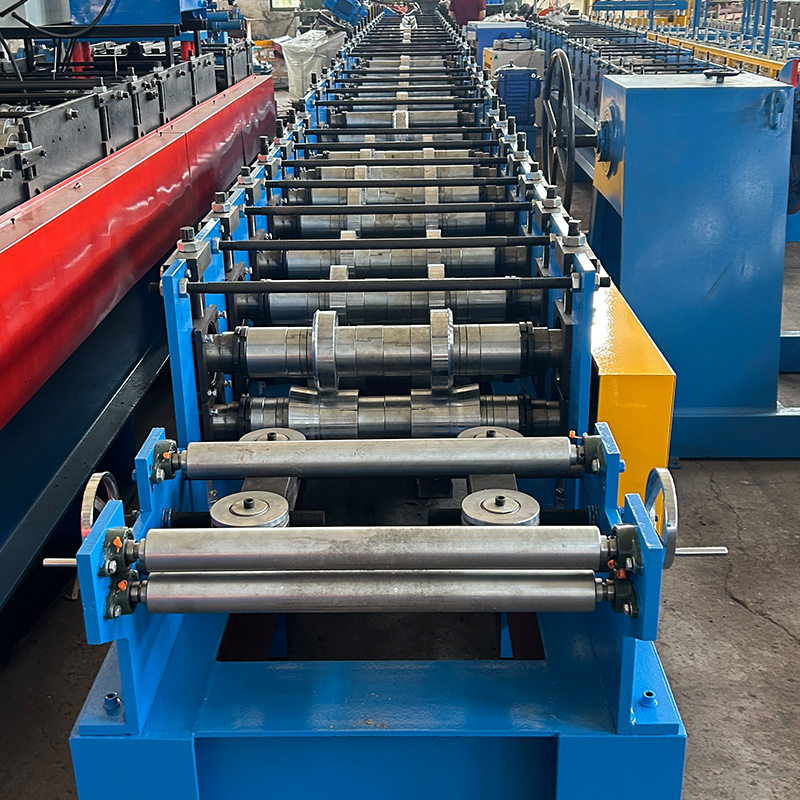
FAQs
Q: What thickness of sheets can be formed?
A:Thickness range capability is 0.15mm to 1.2mm for steel/aluminum. Up to 2mm stainless steel/titanium possible.
Q: What drivetrain system is used in these machines?
A: Basic models use manual hand cranks. Advanced industrial models use servo motor & drives withPLC control for speed, positioning and automation.
Q: Does it require any foundation or base?
A: A flat leveled hard surface like RCC slab is needed. Grouted bolts fix it firmly to avoid vibration at high speeds.
Q: How to calculate power requirement?
A: Depends on sheet metal thickness, no. of rolls, accessories added like punch/notcher. Typically 11kw to 30kw for machines of varying capacity.
Q: Can different width coils be run?
A: Yes. But all forming rollers & decoiler would need changing to match coil width. Time consuming job requiring expertise.
Q: What accuracy and surface finish is achieved?
A: High end CNC machined rolls provide panel accuracy upto +/- 1.0mm and glossy surface finish.
Q: What standards should these machines comply to?
A: ISO 9001 quality certification and CE marking compliance demonstrates rigor in design, manufacturing process and validation testing.
Frequently Asked Questions (FAQ)
1) What line speed should I target for a metal roof roll forming machine in 2025?
- For standard trapezoidal/corrugated panels, 30–60 m/min is typical; premium lines with rotary shear and servo drives reach 80–120 m/min. If you run pre-painted coils, keep speeds conservative to protect coating.
2) How do I choose between cassette tooling and fixed tooling?
- Choose cassette tooling if you run 3+ profiles or frequent changeovers; it cuts changeover to 10–25 minutes. Fixed tooling is lower capex and ideal for high-volume single profiles.
3) Can a single machine handle steel and aluminum coils without quality loss?
- Yes, with proper roll metallurgy (D2 or Cr12MoV), adjustable entry guides, and recipe-based pass settings. You may need different coil payoff tension, lubricants, and cut-depth parameters.
4) What tolerances are realistic for standing seam panels?
- Length ±0.5–1.0 mm/m, rib height ±0.2–0.4 mm, and seam width ±0.3 mm on well-maintained servo lines. Verify with SPC and periodic gauge blocks/laser checks.
5) How do I estimate total cost of ownership (TCO)?
- Add capex + tooling + annual maintenance (2–4% of capex) + energy (kWh/m × annual meters) + scrap cost − labor savings − changeover time savings − warranty reduction. Most high-mix shops see 12–24 month payback.
2025 Industry Trends for Metal Roof Roll Forming Machines
- High-mix agility: Servo-adjustable stands, recipe locking, and QR-based coil traceability are standard on new lines to support short-run architectural panels.
- Sustainable operations: Widespread switch to low-VOC lubricants and closed-loop mist capture; energy monitoring reported as kWh per meter to meet Scope 2/3 goals.
- Safer automation: Light curtains, Category 3 PLd/Category 4 PLe safety, and interlocked guards reduce incidents and insurance premiums.
- Onsite portable forming growth: Contractors deploy mobile standing seam formers to reduce transport damage and meet custom length requirements at site.
- Advanced coatings: PVDF and SMP pre-painted coils with cool roof pigments drive demand for scratch-minimizing roll finishes and non-marring guides.
2025 Benchmarks and Market Snapshot
| KPI / Market Stat | 2023 Typical | 2025 Top Quartile | Notes/Impact | Source |
|---|---|---|---|---|
| Changeover time (profile-to-profile) | 60–120 min | 10–25 min | Cassette tooling + servo recipes | FMA, PMMI |
| Scrap rate on pre-painted coils | 3–5% | 1–2% | Better entry guides, SPC by pass | The Fabricator |
| Energy intensity (kWh per meter) | 0.06–0.10 | 0.04–0.07 | VFDs + optimized lubrication | U.S. DOE AMO |
| Onsite portable former adoption (roofing contractors, NA/EU) | ~22% | ~35% | Cut logistics time; fewer handling dents | NRCA/Metal Construction Assoc. |
| Global metal roofing CAGR (2024–2028) | 3–4% | 4–6% | Infra + re-roofing + cool roofs | MarketsandMarkets/Statista |
Authoritative references:
- Fabricators & Manufacturers Association (FMA): https://www.fmamfg.org
- The Fabricator (Roll forming): https://www.thefabricator.com/topic/roll-forming
- U.S. DOE Advanced Manufacturing Office: https://www.energy.gov/eere/amo/advanced-manufacturing
- National Roofing Contractors Association (NRCA): https://www.nrca.net
- Metal Construction Association: https://www.metalconstruction.org
Latest Research Cases
Case Study 1: Zero-Scratch Standing Seam for PVDF Coils (2025)
- Background: A European architectural panel shop saw 4.1% scrap from micro-scratches on PVDF-coated coils during peak season.
- Solution: Installed non-marring polyurethane entry guides, refined flower pattern to reduce edge contact stress, added inline dry-film lubricant applicator, and recipe-locked shear parameters.
- Results: Surface defects dropped 63% (to 1.5% scrap), FPY improved to 98.3%, and warranty claims declined 41% within 6 months.
Case Study 2: Portable Site-Based Forming for Long-Span Roofs (2024)
- Background: An EPC contractor for logistics centers faced transport damage and joint leaks on 40+ m panels.
- Solution: Deployed a mobile metal roof roll forming machine with onboard decoiler and generator; integrated laser length control and handheld QC gauges.
- Results: Eliminated transport dents, cut install time by 18%, reduced leak callbacks by 55%, and saved ~$42,000 per project in handling/freight.
Expert Opinions
- Dr. Taylan Altan, Director (emeritus), Center for Precision Forming, The Ohio State University
- Key viewpoint: “For coated roofing coils, roll alignment and controlled bending strain are critical to prevent coating micro-cracks, especially at rib peaks.” Source: https://cpf.osu.edu
- Rob Haddock, CEO, S-5! and Metal Roofing Academy Founder
- Key viewpoint: “Roof system performance depends on panel consistency. Accurate seams and clip engagement from the roll forming stage directly affect wind uplift and watertightness.” Source: https://www.s-5.com
- Jim Ward, Senior Technical Director, Fabricators & Manufacturers Association (FMA)
- Key viewpoint: “Shops that link coil certificates to SPC by pass cut scrap in half and stabilize length accuracy on high-speed lines.” Source: https://www.fmamfg.org
Practical Tools/Resources
- SPC and QA
- InfinityQS (cloud SPC): https://www.infinityqs.com
- NIST Engineering Statistics Handbook: https://www.itl.nist.gov/div898/handbook
- Maintenance/PdM
- Limble CMMS: https://limblecmms.com
- Fluke Connect vibration/thermal tools: https://www.fluke.com
- Design and Pass Development
- COPRA RF by data M: https://www.datam.de/en/copra
- The Fabricator roll forming guides: https://www.thefabricator.com/topic/roll-forming
- Safety and Standards
- ISO 14120/13849 safety standards: https://www.iso.org
- OSHA Machine Guarding eTool: https://www.osha.gov/etools/machine-guarding
- Roofing Industry Knowledge
- Metal Construction Association Technical Resources: https://www.metalconstruction.org
- NRCA Technical Services: https://www.nrca.net
Last updated: 2025-10-27
Changelog: Added 5 FAQs tailored to metal roof roll forming machines; inserted 2025 trends with KPI table and sources; provided two recent case studies; included expert viewpoints with citations; compiled practical tools/resources for QA, PdM, design, and safety
Next review date & triggers: 2026-03-31 or earlier if scrap > 2.5%, changeover > 30 min, coating defect claims rise > 0.5% of shipments, or unplanned downtime > 2 hours occurs
